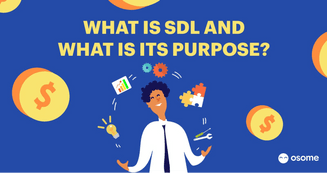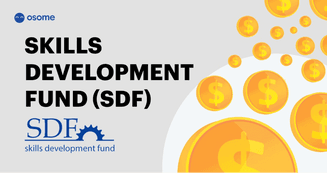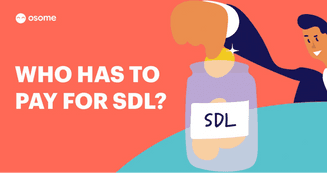- Osome Blog SG
- Skills Development Levy: How Much Must Employers Pay on Their Staff?
Skills Development Levy: How Much Must Employers Pay on Their Staff?
- Modified: 15 August 2024
- 7 min read
- Money Talk


Osome Content Team
VIP Contributor
Osome has been collaborating with 21 authors from 4 countries. We embrace diversity and are proud that lawyers and founders, journalists and financial analysts choose to work with us.
This article will elaborate on this less well known statutory fund that all employers need to pay on each staff they have. Find out how to pay it and more in this article.
Skills Development Levy or SDL is a mandatory levy that companies need to pay for all their employees working in Singapore, other than Central Provident Fund (CPF) contribution and Foreign Worker Levy. It is the responsibility of the CPF Board to collect SDL for SkillsFuture Singapore Agency (SSG).
The mandatory SDL contribution is not limited to the citizens of Singaporean or PR holders. Companies have to pay the levy for all casual, permanent, temporary, part-time, and foreign employees too. For example, SDL also applies to employees who are on EntrePass, Employment Pass, Training Employment Pass, or S-Pass, and PEP.
If you’re here, you might be looking for how to run your company more efficiently and be in control of your company’s finances. Why not look to outsourcing your tasks to our experienced accountants in Singapore while you focus your attention on growing your business’ profits.
What Is SDL and What Is Its Purpose?

The Skills Development Levy, or SDL, is about paying a mandatory fee or levy that employers have to incur every month for all their employees under the Skill Development Levy Act in Singapore. The SkillsFuture Singapore Agency (SSG) manages the levy.
All companies, including private or statutory boards, are liable to pay the SDL for both their local and foreign employees. The SDL contribution does not link to other types of payments like CPF contributions that employers make to other statutory boards.
The purposes of SDL payment is outlined under the SDL Act (Chapter 306):
- The development, promotion, and upgrading of the expertise and skills of individuals who join the workforce, people already in the workforce, and the people rejoining the workforce.
- To retrain dismissed individuals.
- For the provision of financial assistance through grants, loans, or other ways for the purposes mentioned above.
As stated earlier, SDL levies are paid monthly and are different from other contributions that employers make to statutory boards in Singapore. Employers are required to pay SDL regardless of whether they apply for SDF grants or not.
What Is the Skills Development Fund (SDF)?

The Skills Development Fund or SDF funding was set up in October 1979, along with rolling out the Skills Development Levy (SDL) Act. The main purpose of the SDF fund is to encourage employers to invest in upgrading the skills of their employees. Around 2010, the SDF became known as WDA Funding. Before individuals or companies apply for SDF funding, WDA needs to register and pre-approve the courses.
The SDF Singapore provides financial assistance to companies as an incentive to conduct training programmes for employees. The SDF offers incentives on a cost-sharing basis. Also, the training has to be relevant and contributing to the economic progression of Singapore. The amount of incentives that an employer can receive does not have a link to the levy contribution.
Who Has To Pay for SDL?

Employers in Singapore must pay the monthly SDL levy for local and foreign employees, no matter whether they are working on a part-time, casual, or temporary basis.
SDL Singapore is payable by registered employers. If an employer expects that the total salaries will fall within the threshold over the next 12 months, it will be liable to pay SDL.
How Do I Pay the Skills Development Levy on Behalf of My Staff?
Here are the 4 steps you need to follow:
1 Determine the types of employees who are subjected to SDL
As an employer, you have to pay the SDL levy for all your employees, including:
- Local citizens and permanent residents (PR) of Singapore who are employed full-time and part-time.
- Employees working under EntrePass, Employment Pass, Training Employment Pass or S-Pass holders, and PEP.
There are some exemptions applicable if your employees fall in the following groups:
- Employees are working as a gardener, chauffeur, or domestic worker for providing personal services. These staffs have no link to your profession, business, or trade.
- Your employee has not worked in Singapore for a specific month.
Example
For example, Stephanie works for BRACKETS Events Management (fictional company). In the month of September, she was required to undergo training at a tertiary institution and did not render any of her services. As such, BRACKETS events management does not have to pay Stephanie a SDL contribution for the month involved.
2 Find out about the Statutory Contribution Rate & Levy for different salary range
Since October 2008, the mandatory SDL rate is 0.25 percent of your employees’ monthly salary with the maximum cap of S$11.25 (for employees earning more than S$4,500 per month). The minimum levy is S$2 for your employees who earn less than S$800 per month.
Example
For example, Elizabeth earns $5,000 a month. You will have to pay her $11.25 levy. On the other hand, Veronica makes $3,450 a month. The SDL made payable to her would be 0.25% of her monthly remuneration, which amounts to $8.63.
If you have only 2 employees in the company, the total SDL payable for that month would be Elizabeth’s SDL and Veronica’s SDL:
$11.25 + $8.63 = $19.88
After rounding to the nearest dollar, the SDL payable is $20.
If you’re still unsure on how to compute this, you can use SDL’s Calculator for clarity.
3 Pay your SDL
You can pay the SDL amount, along with the monthly CPF SDL contributions of your employees. If you recruit only foreign employees, then you can pay the due SDL CPF amount directly to SkillsFuture Singapore.
You can pay the CPF levy using the following three options:
CPF e-submit@web
You can pay the SDL along with your employees' monthly CPF contributions through CPF e-submit@web
E-payment service at SDL website
When you have only foreign employees, make payment through the E-Payment section of the SDL website.
Cheque + SDL Return form
To pay directly to SkillsFuture Singapore (SSG), you can make a direct bank transfer or issue a crossed cheque payable to ‘Skills Development Fund.’
You need to include mandatory details such as your company’s name, payment month, contact person, and contact address in the Skills Development Levy Return Form.
4 Adhere to the due dates
The SDL regulations require you to pay the SDL for your employees within 14 days by the end of the month. If you fail to do so, there will be an annual late payment penalty of 10% of the outstanding fee.
Remain Compliant
While running a business in Singapore, you have loads of things to manage in terms of the operational efficiency and profitability of the company. You also think of growing your business by seamlessly managing every day-to-day task, which is never easy.
On top of it, compliance with government regulations and tax payments are necessary to manage your business without any hiccups. If you get professional support to manage compliance issues like paying SDL, you will be able to focus on taking your business to the next level. At Osome, we can provide you with comprehensive support in adhering to statutory obligations, including reminding you of the deadlines and paying taxes/levies on time.With our help, it will take just a few minutes to complete your paperwork. All you need to do is sign up to get your corporate secretarial tasks, and we will take things forward from there.
FAQ
What is SDL and why wo I need to pay SDL for my employees?
The Skill Development Levy or SDL is a monthly fee that all employers have to pay for their employees in Singapore. This levy is payable regardless of employment types such as full-time, part-time, temporary, contract, or casual. This rule applies even for Employment Pass holders and Work Permit holders.
What categories of employees and workers don't need to pay levy for?
The following categories of employers do not have to pay the monthly SDL for their employees:
- Businesses in Singapore hiring staff from outside the country and who need to work overseas for their jobs. For example, if a Singapore-based company hires an employee in the US to grow its business in North America.
- Companies in Singapore hire workers within the country but send them overseas to work in a satellite office. For example, a Singapore resident is transferred to the company’s Thailand or Indonesia office.
- Companies that pay fees to directors, which do not require an SDL. However, if the company pays them a monthly salary, then this levy will apply.
- Self-employed people in Singapore do not need to pay a monthly SDL for their income. However, if they hire staff or contractors, then they have to pay the SDL.
- Stipend amounts paid to interns or students for their work during vacation do not require SDL contributions.
- Individuals who hire people for doing household tasks do not have to pay SDL.
How do I get a refund if there is an over-payment?
If you have overpaid the Skills Development Levy (SDL), you can request a refund from SkillsFuture Singapore Agency (SSG).
Send your refund request to:
SkillsFuture Singapore Agency (SSG)
#08-08, Paya Lebar Quarter 2
1 Paya Lebar Link
Singapore - 408533
How to calculate SDL?
Companies in Singapore that are required to pay SDL need to consider the total monthly salary of each employee.
The compensation will include the base salary, bonuses, overtime pay, commission, and other allowances. Paying cash to employees is also included. This is why the amount of SDL contribution may vary from one month to another, as it depends on how much compensation an employee receives in a month.
The SDL calculation formula is below:
The SDL rate of contribution is 0.25% of employees’ monthly salary. The minimum SDL levy amount is S$2, and the maximum amount is S$11.25.
Example
Salaries up to S$800 per month will have a levy of S$2.
For salaries between S$800 and S$4,500 have a 0.25% levy.
For salaries more than S$4,500, pay a flat levy of $11.25.
For more accurate calculations, you can use SSG’s SDL calculator.
How to apply for Skills Development Levy grants?
The SDL contributions aim to help businesses with funds to upgrade their workforce and foster individual growth.
You can get detailed information on various grants and schemes from the Skills Connect portal for businesses and individuals in Singapore.






